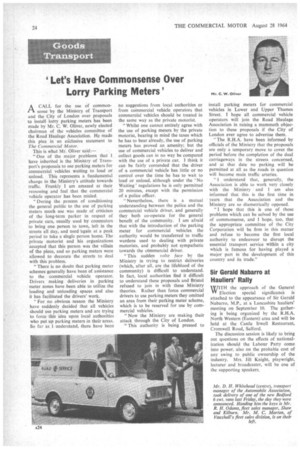'Let's Have Commonsense Over Lorry Parking Meters'
Page 26

If you've noticed an error in this article please click here to report it so we can fix it.
ACALL for the use of common
sense by the Ministry of Transport and the City of London over proposals to install lorry parking meters has been made by Mr. C. W. Oliver, newly elected chairman of the vehicles committee of the Road Haulage Association. He made this plea in an eiclusive statement to The Commercial Motor.
This is what Mr. Oliver said:— " One of the major problems that I have inherited is the Ministry of Trans port's proposals to use parking meters for commercial vehicles waiting to load or unload. This represents a fundamental change in the Ministry's attitude towards traffic. Frankly I am amazed at their reasoning and feel that the commercial vehicle operator has been misled.
"During the process of conditioning the general public to the use of parking meters much use was made of criticism of the long-term parker in respect of private cars, usually used by commuters to bring one person to town, left in the streets all day, and used 'again at a peak period to take a single person home. The private motorist and his organizations accepted that this person was the villain of the piece, and so parking meters were allowed to decorate the streets to deal with this problem.
"There is no doubt that parking meter schemes generally have been of assistance to the commercial vehicle operator. Drivers making deliveries in parking meter zones have been able to utilize the loading and unloading spaces and also it has facilitated the drivers' work.
"For no obvious reason the Ministry have suddenly decided that all vehicles should use parking meters and are trying to force this idea upon local authorities who put up parking meters in their areas. So far as I understand, there have been no suggestions from local authorities or from commercial vehicle operators that commercial vehicles should be treated in the same way as the private motorist.
" Whilst one cannot entirely agree with the use of parking meters by the private motorist, bearing in mind the taxes which he has to bear already, the use of parking meters has proved an amenity; but the use of commercial vehicles to deliver and collect goods can in no way be compared with the use of a private car. I think it can be fairly contended that the driver of a commercial vehicle has little or no control over the time he has to wait to load or unload, although under the No Waiting' regulations he is only permitted 20 minutes, except with the permission of a police officer.
"Nevertheless, there is a mutual understanding between the police and the commercial vehicle driver, and generally they both co-operate for the general benefit of the community. I am afraid that with the introduction of the parking meter for commercial vehicles the authority would be transferred to traffic wardens used to dealing with private motorists, and probably not sympathetic towards the cbmmercial driver.
"This sudden voile face by the Ministry in trying to restrict deliveries (which, after all, are the lifeblood of the community) is difficult to understand. In fact, local authorities find it difficult to understand these proposals and Bristol refused to join in with these Ministry theories. Rather than force commercial drivers to use parking meters they omitted an area from their parking meter scheme, which is to be reserved for use by corn• mercial vehicles.
"Now the Ministry are making their attack through the City of London.
" This authority is being pressed to install parking meters for commercial vehicles in Lower and Upper Thames Street. I hope all commercial vehicle operators will join the Road Haulage Association in raising a mammoth objection to these proposals if the City of London ever agree to advertise them.
"The R.H.A. have been informed by officials of the Ministry that the proposals are only a temporary move to cover the period before the completion of the dual carriageways in the streets concerned, and at that date no parking will be permitted at all as the roads in question will become main traffic arteries.
"1 understand that, generally, the Association is able to work very closely with the Ministry and I am also informed that this is the first time in years that the Association and the Ministry are so diametrically opposed.
"I hope that this is one of those problems which can be solved by the use of commonsense, and I hope, too, that the appropriate committee of the City Corporation will be firm in this matter and refuse to become the first local authority to endeavour to disrupt the essential transport service within a city which is famous for having played a major part in the development of this country and its trade."




















































































































